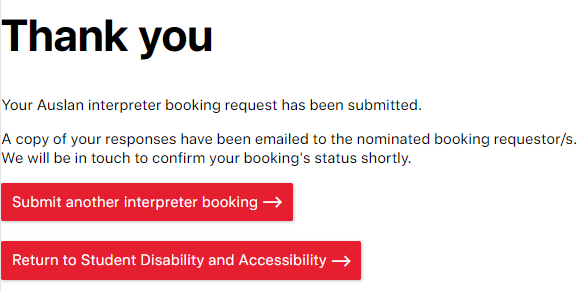How to book and work with Auslan interpreters, and plan inclusive events at Griffith University
New to working with people needing access to Auslan interpreters? Griffith's Deaf Student Support Program (DSSP) can guide you in developing inclusive events and activities and will help you book interpreters/advise how you can book captioning services or other assistive technology where required.
Note: Teaching and learning activities for enrolled Griffith students who require Auslan interpreters are managed centrally through the DSSP. Staff do not need to make arrangements for interpreters to support students enrolled in scheduled courses or programs at Griffith University or Griffith College.
Sustainable Development Goals
Griffith University is aligned with the United Nation’s Sustainable Development Goals (SDGs) and is committed to contributing to a more equitable and just society, where everyone has a chance to thrive and contribute to sustainable development.
Support for the Deaf
Our NAATI- accredited Auslan interpreters abide by a strict Code of Ethics where confidentiality is central to their practice. Their services are in high demand so please book early to avoid disappointment.
Students please note: Our booking forms (below) are for use by authorised booking agents and Griffith staff only. Please ask your Disability Services Officer/Senior Disability Advisor to request Auslan interpreter bookings on your behalf.
Book Auslan interpreters (authorised agents only)
Book Auslan interpreters (Griffith staff only)
Captioning and transcription services
Everyone benefits when captions accompany dialogue that is spoken quickly by people with different accents, or where there is competing background noise. In using captioned material, event organisers also benefit as transcripts can be used later in minutes or reports. Events can be captioned in person or via remote link.
Our captioning services are in high demand so should be booked early. Visit our captioning and transcription site or contact our team for more information and to book these services.
Visit captioning and transcription
Email disability@griffith.edu.au
Support for people who are hard of hearing
Hard of hearing persons often benefit from access to captioning services and/or infrared hearing systems. Infrared hearing systems are a special type of sound system for use by people with hearing aids or cochlear implants. Presenters will often wear a microphone or other sound source, and the audio input is then emitted as an electrical signal.
Contact the IT Service Centre to check if your venue is equipped with an infrared hearing system.
Planning inclusive events
Book interpreters and captioners early
Don't leave interpreter or captioning requests to the last minute! Complete an Auslan interpreter booking form or contact the captioning and transcription team at least at least two weeks in advance (for one-off events, such as meetings); at least four weeks in advance for scheduled classes, recurring and large events (such as graduation ceremonies); and at least six weeks in advance for events requiring more preparation time (such as conferences).
DSSP and the student disability and accessibility teams will review your request and contact you if further information is required. You may be asked to provide additional documentation such as flyers, draft agendas or presentations which will be passed on to interpreters and captioners.
No longer require interpreters/a captioning service? let us know well before your event to avoid cancellation fees. Fee details are outlined in our booking terms and conditions (PDF, 1.44Mb).
Consider your audio-visual equipment needs
Do you want captions displayed on a large screen for all to see? You may also wish to consider a TV monitor facing the stage for the benefit of presenters and panel members. Either way, it's a good idea to request audio visual support so they can be on hand to provide technical support to the captioning service, whether it be in-situ or via remote link.
Review audio-visual materials
If you intend to screen videos, it is wise to check for captions. Relying on auto-captions runs the risk of displaying inappropriate language. Take the time to watch and check your videos. Some useful resources about captioning suppliers can be found on our captioning and transcription website.
If there are any last-minute time or location changes, please advise the DSSP as soon as possible. Some changes may result in cancellation or amendment fees, as outlined in our booking terms and conditions (PDF, 1.44Mb).
Interpreters and captioners will usually arrive around 30-45 minutes early and introduce themselves to the event contact/client noted on the booking form.
Interpreters will typically require seating at the front of the venue, with in-ear pieces (if in a large room such as a lecture theatre/conference hall) so they can clearly hear the proceedings. Interpreters will assess the physical set up and will stand on either side of the presenter at a suitable distance depending on the size of the room and the proximity to screens. Although interpreters may have all of your event material on their mobile devices; they'll always appreciate a hardcopy of materials provided on the day.
To ensure the safety and wellbeing of our interpreters and minimise the risk of physical and mental fatigue (occupational overuse syndrome (OOS)), interpreters will typically discuss and agree on regular breaks with you before a scheduled booking. For example:
- One-hour booking: Interpreter/s may request two x five-minute breaks, or one 10-minute break
- Two- to five-hour bookings: Interpreters will require 15-30 minute breaks, at regular intervals
- Bookings greater than five hours in length: Interpreters will require 15-30 minute breaks at regular intervals, plus adequate time for a 'lunch' break (at least 30 minutes, though 45 minutes is preferred).
Captioners can be flexible in where they sit, as long as they are able to connect and test their technical equipment to ensure captions can be displayed on screen. It can be helpful to have audio visual support available during set-up, to reduce the chance of any technical issues.
After your booking, please let us know how things went. Whether you were pleased or unhappy with the interpreter/s who attended we appreciate all feedback so we can continue to improve our booking service.
If you are an external booking requestor, you will be sent an advisory note (once a month) outlining the breakdown of fees before an invoice is sent for payment. If external interpreters and/or captioning services have been engaged, these invoices will be emailed directly to you.
If you are an internal (Griffith staff) booking requestor, we will supply an estimate of fees to you when you request the booking, and once complete will forward interpreter salary approvals to your nominated finance delegate. If external interpreters and/or captioning services have been engaged, these invoices will be emailed directly to you.
How to book our Auslan interpreters
Tips on working with Auslan interpreters
Before you begin: Be up front
Explain any jargon or specialised language you intend to use. If possible, provide a run sheet or agenda, names and titles of participants when you book, so the interpreter can prepare beforehand.
Discuss breaks so the interpreter can rest and avoid occupational overuse syndrome (OOS). Once agreed, set a timer on your watch/device to ensure you remember them.
Establish turn taking rules at the start with all participants. It is impossible to interpret more than one person at a time.
Ask where to sit. Ask the Deaf person and interpreter about preferred seating arrangements. Although interpreters often sit next to the main speaker so the Deaf person can see both people simultaneously, this is not always the case.
Who to address (and how)
Speak directly to the Deaf person, as you would any other person. Focus your full attention and eye gaze on the Deaf person – not the interpreter – even if they are looking at the interpreter and not you.
Don't expect interpreters to answer. Interpreters are bound by their code of ethics to be impartial; therefore, it is inappropriate for them to answer questions regarding their opinion.
Speak clearly, at your usual pace and volume. It's not necessary to wait for interpreters to catch up between each sentence. The interpreter will tell you if your pace is too slow/fast.
Allow adequate time for the Deaf person to read printed/digital materials and to take notes – it is impossible to watch an interpreter and read/write at the same time.
Understand what will be interpreted/relayed
Skip the asides. Interpreters are ethically obliged to interpret everything the Deaf person would have understood if they could hear spoken English. Keep this in mind before having a side conversation.
Not every word is translated. Auslan (Australian Sign Language) is a language in its own right; with a different sentence structure, grammar and idioms. The interpreter is there to translate the meaning from one language into the other, rather than translating verbatim.
Humour doesn't always translate well from one language to another. Many English jokes are based on a play on words, or the humour lies in the way something is said. Don't be offended if the Deaf person does not laugh at these jokes.


